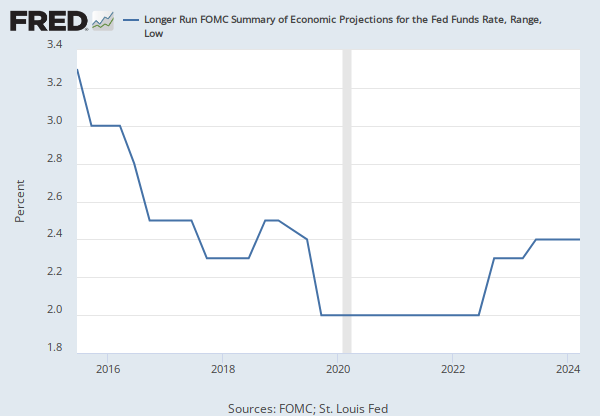Observations
2025-03-19: 2.6 | Percent, Not Seasonally Adjusted | Not Applicable
Updated: Mar 19, 2025 2:08 PM CDT
Observations
| 2025-03-19: | 2.6 | |
| 2024-12-18: | 2.8 | |
| 2024-09-18: | 2.5 | |
| 2024-06-12: | 2.5 | |
| 2024-03-20: | 2.5 |
Units:
Frequency:
Write a custom formula to transform one or more series or combine two or more series.
You can begin by adding a series to combine with your existing series.
Now create a custom formula to combine or transform the series.
Need help?
For example, invert an exchange rate by using formula 1/a, where “a” refers to the first FRED data series added to this line. Or calculate the spread between 2 interest rates, a and b, by using the formula a - b.
Use the assigned data series variables (a, b, c, etc.) together with operators (+, -, *, /, ^, etc.), parentheses and constants (1, 1.5, 2, etc.) to create your own formula (e.g., 1/a, a-b, (a+b)/2, (a/(a+b+c))*100). As noted above, you may add other data series to this line before entering a formula.
Finally, you can change the units of your new series.
Add the minimum, maximum, and average calculations of selected bars to the graph
Write a custom formula to transform one or more series or combine two or more series.
You can begin by adding a series to combine with your existing series.
Now create a custom formula to combine or transform the series.
Need help?
For example, invert an exchange rate by using formula 1/a, where “a” refers to the first FRED data series added to this line. Or calculate the spread between 2 interest rates, a and b, by using the formula a - b.
Use the assigned data series variables (a, b, c, etc.) together with operators (+, -, *, /, ^, etc.), parentheses and constants (1, 1.5, 2, etc.) to create your own formula (e.g., 1/a, a-b, (a+b)/2, (a/(a+b+c))*100). As noted above, you may add other data series to this line before entering a formula.
Finally, you can change the units of your new series.
Add the minimum, maximum, and average calculations of selected bars to the graph
Data in this graph are copyrighted. Please review the copyright information in the series notes before sharing.
Notes
| Title | Release Dates | |
|
|
||
| Longer Run FOMC Summary of Economic Projections for the Fed Funds Rate, Central Tendency, Low | 2015-12-16 | 2025-03-19 |
| Source | ||
|
|
||
| U.S. Federal Open Market Committee | 2015-12-16 | 2025-03-19 |
| Federal Reserve Bank of St. Louis | 2015-12-16 | 2025-03-19 |
| Release | ||
|
|
||
| Summary of Economic Projections | 2015-12-16 | 2025-03-19 |
| Units | ||
|
|
||
| Percent | 2015-12-16 | 2025-03-19 |
| Frequency | ||
|
|
||
| Not Applicable | 2015-12-16 | 2025-03-19 |
| Seasonal Adjustment | ||
|
|
||
| Not Seasonally Adjusted | 2015-12-16 | 2025-03-19 |
| Notes | ||
|
|
||
|
The longer-run projections are the rates of growth, inflation, unemployment, and federal funds rate to which a policymaker expects the economy to converge over time in the absence of further shocks and under appropriate monetary policy. Because appropriate monetary policy, by definition, is aimed at achieving the Federal Reserve's dual mandate of maximum employment and price stability in the longer run, policymakers' longer-run projections for economic growth and unemployment may be interpreted, respectively, as estimates of the economy's longer-run potential growth rate and the longer-run normal rate of unemployment; similarly, the longer-run projection of inflation is the rate of inflation which the FOMC judges to be most consistent with its dual mandate in the longer-term. The projections for the federal funds rate are the value of the midpoint of the projected appropriate target range for the federal funds rate or the projected appropriate target level for the federal funds rate at the end of the specified calendar year or over the longer run. Each participant's projections are based on his or her assessment of appropriate monetary policy. The range for each variable in a given year includes all participants' projections, from lowest to highest, for that variable in the given year; the central tendencies exclude the three highest and three lowest projections for each year. This series represents the low value of the central tendency forecast established by the Federal Open Market Committee. Digitized originals of this release can be found at https://fraser.stlouisfed.org/publication/?pid=677. |
2015-12-16 | 2025-03-19 |
Release Tables
Related Data and Content
Data Suggestions Based On Your Search
Content Suggestions
Related Categories
Releases
Tags
Permalink/Embed
modal open, choose link customization options
Select automatic updates to the data or a static time frame. All data are subject to revision.









